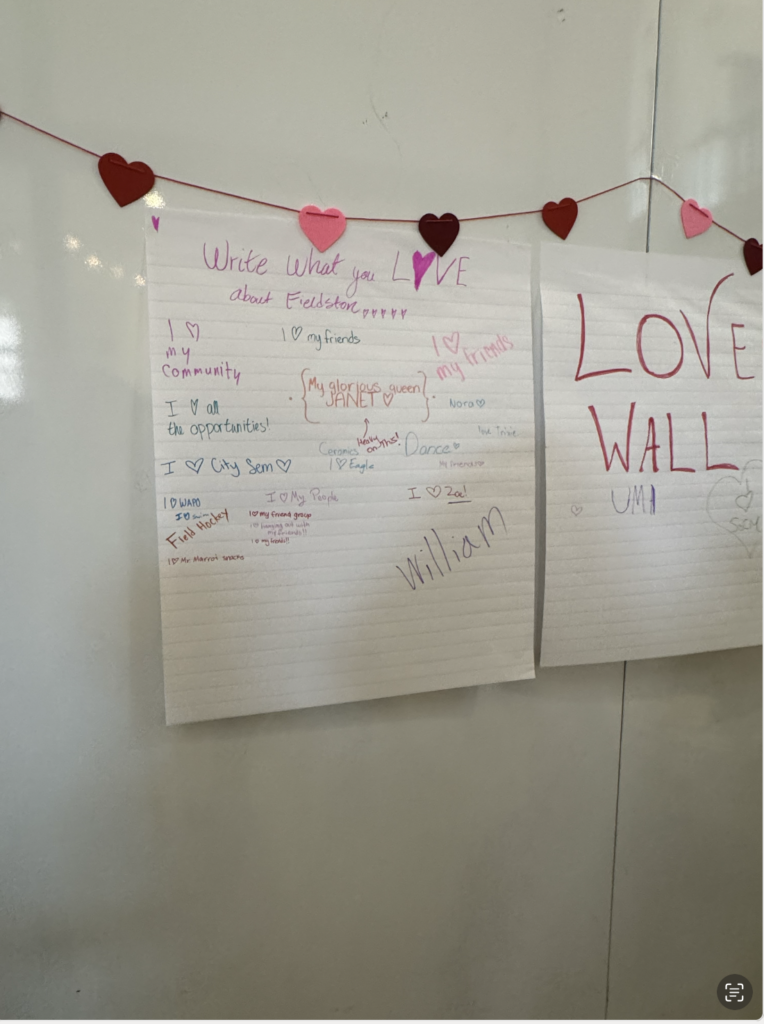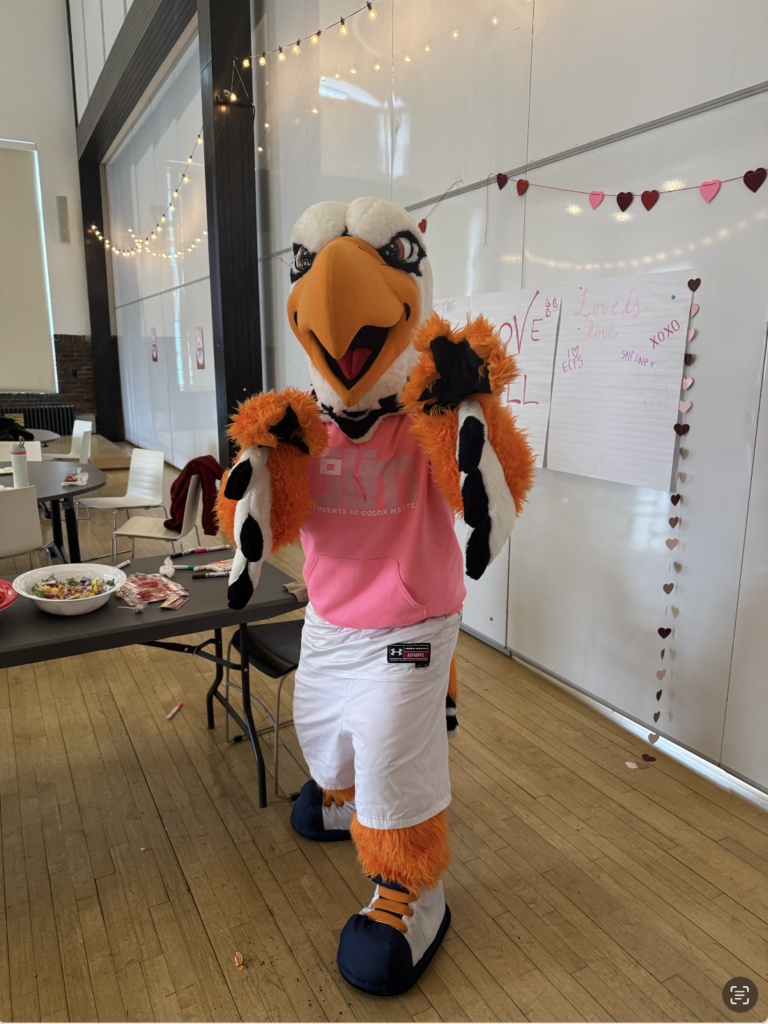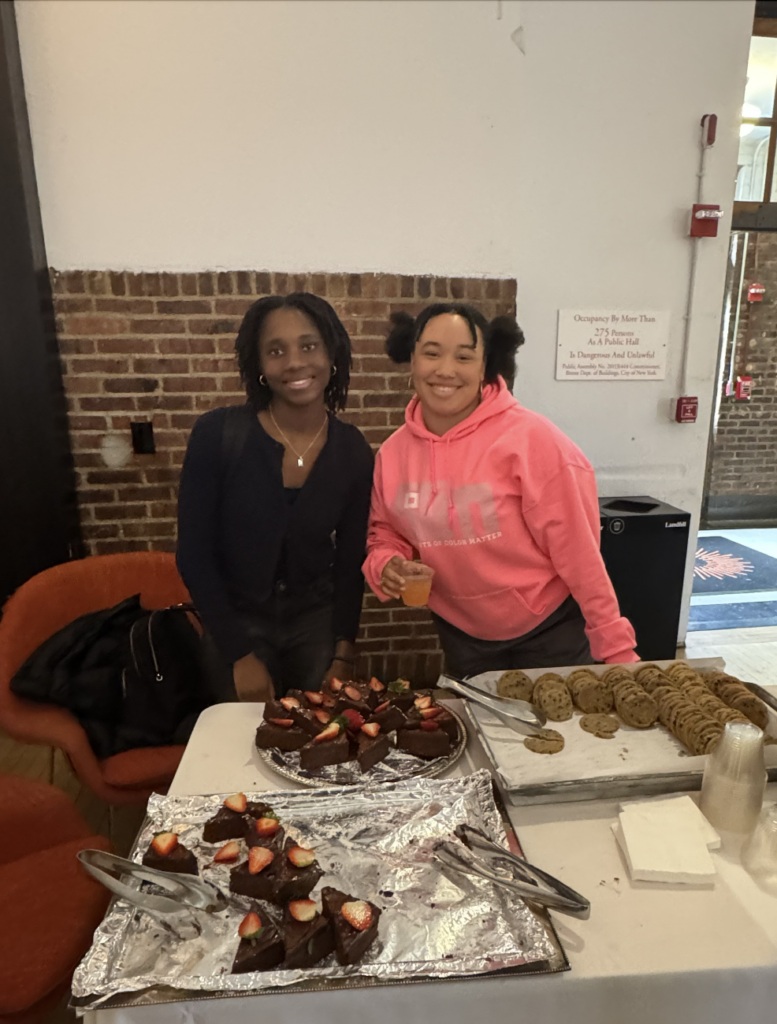Editors’ Note: All photos are credited to Sarah Damon
In an effort to strengthen the school’s sense of community, especially following the challenges faced by students and faculty last spring, Fieldston held a special programming day on February 13, 2025. Centered around the theme of “Building Community,” the day featured a range of sessions and guest speakers aimed at fostering connection, understanding and engagement within the school.
Reflecting on the event, Upper School Principal Stacey Bobo shared, “The day was filled with excellent speakers and students walked away with beginning skills on how to have difficult conversations and assess media content.”
The day began with a schoolwide (well, half of it) assembly organized by Shannon Matlovsky, Interim Executive Director of the Belonging and Social Impact (BSI) Department. Students were then grouped by Form to participate in three sessions. The event concluded with a Valentine’s Day Social hosted by Students of Color Matter (SOCM).
Educator and Youth Development Professional Morris Ervin returned to Fieldston to lead a session on “The Power of Empathy.” “My job is to hear people’s hearts,” he shared. He urged students and faculty to remain steadfast in their efforts to understand each other. “ You aren’t on common ground now, but you will be if you stay persistent,” he reminded them.
Encouraging community members to consider how they respond to themselves and others, Ervin noted that true connection begins with understanding oneself. “I know who I am; now I have space to hear other people,” he explained. Ervin also acknowledged that people may disappoint one another, but empathy allows for recognition and growth. “Hold on to your values, but let go of your expectations,” he advised. He challenged students to be mindful of the content of their language, saying, “I want you to be aware of the messages you give out and the messages you receive.”
Ervin recently published a book titled “Reflections of a Troubled Black Man: A Teacher’s Quest, Turning Fear Into Strength, and Pain Into Passion.” His address to the Fieldston community, which included animal ears, tossing balls and essential oils, was an engaging and unexpectedly aromatic experience in the StuFac. He left the community with a powerful reminder, “Together we heal. More love, less fear.”
Jason Craig Harris and Cara Raich, both experts in restorative justice, led a session titled “Difficult Conversations.” The workshop aimed to help students move beyond reactionary responses and engage in challenging discussions.
Central to their approach were three core principles – empathy, curiosity and humility – which Raich described as “the ingredients for a transformative dialogue.”
“One message we would want to share with the Fieldston community is the idea that we can have courageous conversations about any topics – including hot-button issues – as long as we have the right skills and the right tools to have the conversation,” said Harris. “Cara and I often tell people that we focus too much on the what of the conversation and not enough on the how of the conversation.”
Harris and Raich used scenarios to guide students through practicing respectful dialogue in difficult conversations, hoping to better equip them with strategies for constructive discourse.
In the Tate Library, students participated in a two-part session on media literacy. One section was an elective that examined the influence of either AI or social media on information consumption. The other section focused on media literacy in news outlets. Students completed a scavenger hunt using the Tate’s “News Literacy Resources” webpage. The activities aimed to develop the ability to assess and verify information found within today’s complex media landscape.
The student body expressed a wide range of opinions on the day.
Some students appreciated the sessions and their intended impact. Han Lane (Form V), acknowledged their value, “A lot of people didn’t really want to be here, but I do think it’s beneficial for the junior grade particularly.” Janelle Bilbao (Form V) pointed out, “Today was important in helping us become more open to learning and understanding each other’s values and perspectives.” Daphne Dominguez (Form IV) added, “I think the conversations we had today were important, and they really did help improve my conversation skills, especially when having difficult conversations.” An anonymous Form IV student joked, “Morris Ervin helped me get in touch with my inner giraffe.”
Others felt the sessions could have been more effective had more students participated. Ari Dubner (Form V) remarked, “I thought the students who decided not to show up on Thursday were the same students who would’ve benefited the most from the day.” Cristina Ellis (Form V) shared, “I understand that it’s supposed to be helpful for us, but at the same time, so few people showed up.” She continued, “I feel like the activities we did didn’t help me gain insight in how to have difficult conversations. The only thing that came out of Mr. Morris’ session was several people getting hit in the head with flying projectiles.” Zena Imafdon (Form V) was similarly unimpressed, “I’d rather be in school, especially since half of our grade isn’t even here today. It just feels like a big waste of time.”
A few students enjoyed certain aspects of the programming but found others lacking. Bailey Blake (Form III) was disappointed with the media literacy session, saying, “It was just a Google Form we had to fill out. But I’m glad they are trying to teach us about media literacy, especially in this day and age.” Quincy Clark (Form III) revealed a similar view, “The Google Form was really basic. Filling it out was a waste of time. The ‘Difficult Conversations’ session was interesting, but the topics were really sensitive for some people. I personally wasn’t affected but some of my friends could have been.” He did, however, enjoy the “Power of Empathy” session with Ervin.
Nour Wells (Form III) found the empathy session to be the most efficacious as well, calling it “productive, informative, and engaging.” She said the other sessions weren’t as helpful as they seemed they should have been. AvaLee Carter (Form III) agreed, adding, “I think the empathy discussion was a lot more powerful than the other discussions.” She wished that the “Difficult Conversations” session had been more personal, explaining, “It was just the person telling us what the scenarios were instead of letting us share our own experiences.”
Ela Garlin (Form V) questioned the overall impact of the day, “I think the school has overestimated the importance of this day. It’s nice in theory, but their intentions don’t actually carry out.”
Faculty members weighed in with their perspectives as well.
Math teacher Clay Kaufman praised the event’s content, saying, “The speakers that I heard were really good. They had some interesting content about AI and thinking about what to trust and what not to trust, which gave us all something important to think about.” Kaufman spoke about how people may react strongly when something is said that puts them on the defensive, “You don’t wind up having a conversation – you just have a fight.” He continued, “I think one of the things this country needs is a lot more love and a lot less fighting. Anything we can do to help figure out how to listen to each other and how to have more empathy is a great thing.”
Leslie Spalding, a Spanish teacher and strong advocate for love and empathy, stated, “The activities on Difficult Conversations and Empathy are not only essential for our school but are a top priority for the chaos of today’s world.”
Form V Dean Vincent Drybala compared the necessity of these discussions to routine self-care, “Bias builds up. Prejudice builds up. You don’t brush your teeth once and say ‘Cool, I’m done.’ You have to do it consistently because stuff builds up.” He also talked about how social media tends to reinforce opinions, observing, “We exist in a culture where it’s easy to find ourselves in echo chambers that reinforce what we want to hear. We exist with social media that always shows us what we want to see. I think today helps us as individuals and as a community to recognize the importance of preventative care in understanding the value of community.”
SOCM’s Valentine’s Day Social was a lively and joyful way to end the day and brought students together through music, dancing, delicious food and plenty of bright pink sweatshirts.
SOCM leaders expressed their excitement about the event’s success. “During the planning process, I was really excited for all to come together. I’m just so happy that we got to see everyone having fun and dancing together,” said leader Zoe Ventura (Form VI).
Fellow leader Jay Brooks (Form VI) remarked, “SOCM has been working all year to have an event for everybody, not just SOCM members. It’s good that we got together and even better that people actually showed up. People don’t have to be here, so we really appreciate those that did actually come out.” He also commented on the day as a whole, “The day was great, too. I think the people that showed up definitely put their heart in it even if they didn’t want to be here. Not a lot of seniors showed up but the ones that did were very willing to participate.”
Other leaders like Alex Bello (Form V) emphasized the broader significance of SOCM’s work, saying, “This is a great opportunity for the school to see some of the work SOCM does. SOCM is a really integral part of Fieldston and we’re glad more and more people are getting to see that and truly understand the work we do.” He echoed earlier sentiments about how the event was meant for all students, not just students of color, and served as a powerful way to strengthen the community. “Events like these are going to become yearly, if not multiple times a year. We’re really glad to everyone who came out; we had a great turnout. We’re happy this event was such a success,” Bello said.
Negasi Shakes (Form V) had a similar perspective, adding, “It just brings the community together so much more for us to invite everybody here and enjoy themselves – especially before Valentine’s Day, which is the Day of Love.”
Upper School film teacher Shaun Senviratne enthusiastically shared his thoughts on the Social, exclaiming, “Valentine’s Day Social was lit. We got ‘litting’. Everyone that didn’t come was a joker. Peace.”
Attendees of the SOCM Social had a fantastic time. Marcus Frank (Form VI) found the event “very fun.” Hazel Christensen (Form VI) particularly enjoyed the dancing and said, “We all came together today.” A Form IV student simply cheered, “I loved the Valentine’s Day Social.” Esme Egan commented, “I like the pink sweaters, and the food is really good.” Alex Taube (Form V) praised, “It was really fun, and everyone that organized it put a lot of work into it.”
Janet Pugh, the Social Impact Lead and a faculty advisor to SOCM, said with a smile, “We thought that this would be a wonderful way to end the day after a lot of hard work and leaning into hard discussions. What a high note!”
While reactions to the special programming day were mixed, the underlying message of the event is important for the school to remember: have empathy, give grace and critically consume and assess information. The challenge moving forward is to ensure that these lessons extend beyond a single day. If the school can embed these conversations into everyday interactions and possibly its broader culture, Fieldston has the potential to cultivate a community that is not only aware of its differences but actively works towards understanding and unity.










